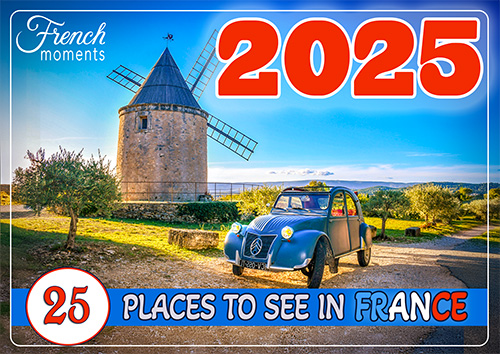The Vosges farm inns may not ring a bell if you’ve never travelled to this corner of north-eastern France, yet they are among the most authentic and heart-warming experiences you can have in the French countryside.
The Vosges is a mountain range that rises gently between Alsace and Lorraine, less famous than the Alps or the Pyrenees, but no less captivating.
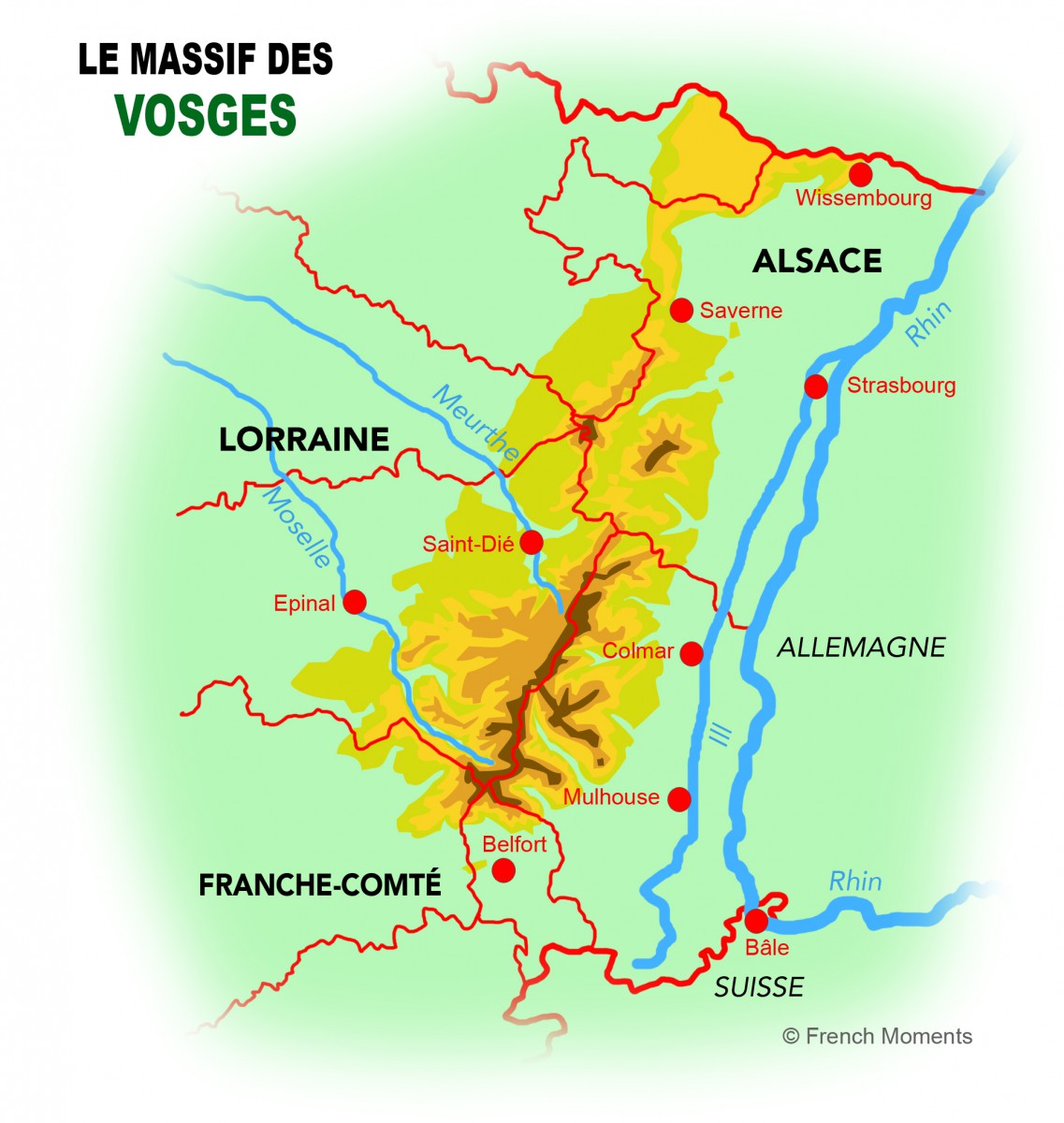
Here, rolling forests give way to high meadows known as chaumes, where cows graze and farmers still make Munster cheese by hand.
It’s in this landscape that the farm inns were born — part working farm, part rustic eatery — offering hikers and travellers a meal steeped in tradition and a welcome rooted in simplicity.
In the article below, we’ll step inside this world and discover what makes them so special.
A journey to the heart of the Vosges
A few years ago, on a bright summer’s morning, I set off up a valley in the Vosges.
The path climbed gently through dense forest, before opening out onto the hautes chaumes — those vast upland meadows that ripple in the wind.
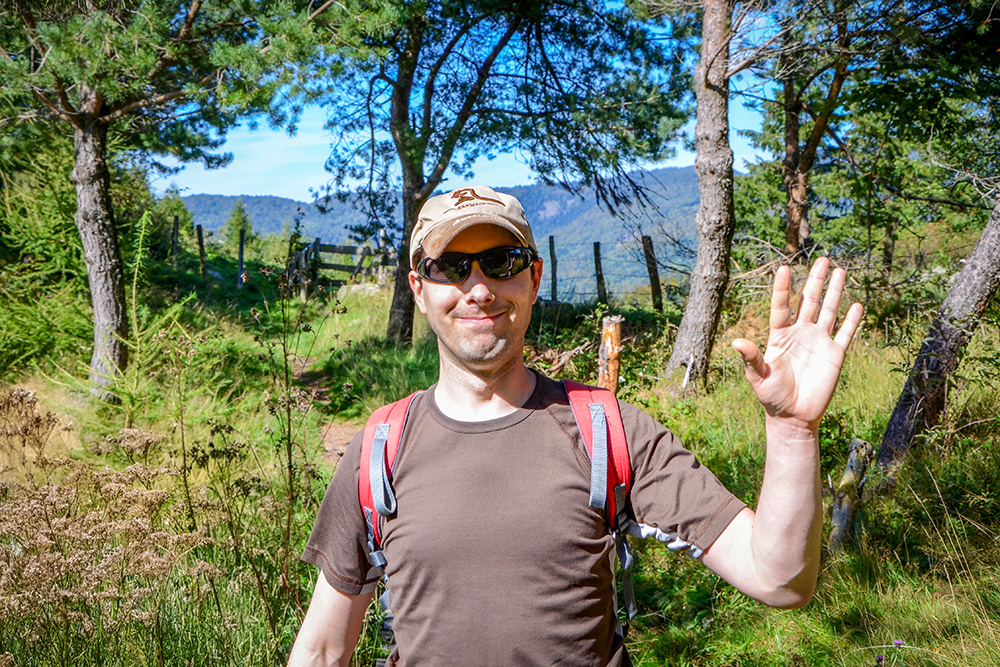
On a walk in the Vosges mountains © French Moments
Up there, after several hours of walking, a reward awaited me: the famous marcaire meal.
I’ve never been a great fan of smoked meat, but the tender potatoes — the roïgabredeldi — had that unmistakable taste of the land, and the blueberry tart, served warm, scented the air with a sweet aroma that clung to the fingers.
With my stomach happily full, I stretched out in the grass for a sunlit nap, my gaze drifting across a panorama of ridges and valleys.
When I lived in Alsace, I often came to these mountains — to the Rossberg-Thanner Hubel, the Molkenrain or the Grand Ballon.
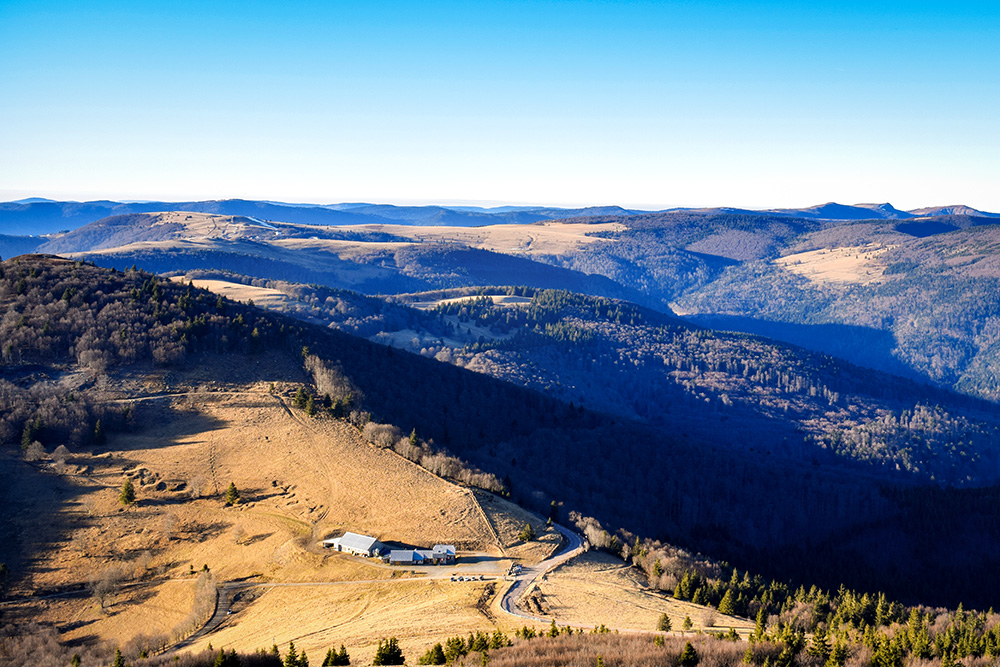
The Upper Vosges seen from the Grand Ballon © French Moments
Many outings ended, almost by instinct, with a stop at a farm inn: it was impossible to resist the smell of hot cheese and a tart just out of the oven.
One evening, I even spent the night on straw in a farm inn, not far from the pigs — rustic, certainly, but unforgettable!
But then, what exactly is a ferme-auberge?
It’s not just a rustic mountain restaurant.
No. It’s far more than that: a living heritage, a centuries-old tradition, and a unique experience that the Vosges still offer to anyone willing to venture up there.
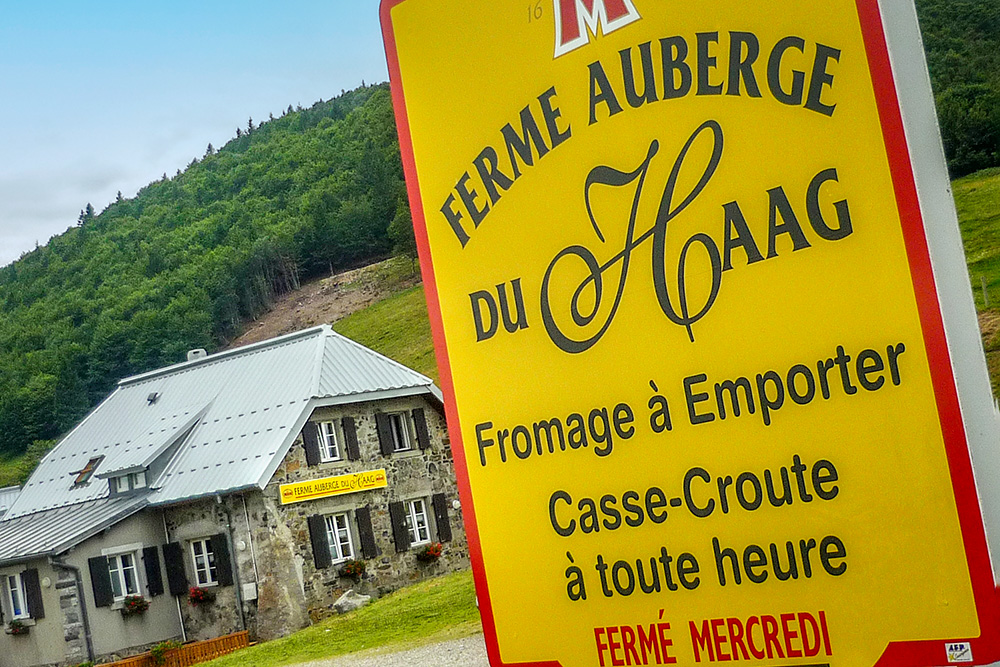
Ferme Auberge du Haag near the Grand Ballon © French Moments
The Vosges Farm Inns – What are They?
Picture a mountain farmhouse where cows are still kept, where cheese is made in the back kitchen, and where you’re served at the table what the farm has produced that very morning.
That, in broad strokes, is a farm inn or, in French, une ferme-auberge.
It isn’t a “theme restaurant” playing at rustic charm with fake beams and a few earthenware pots hung on the walls.
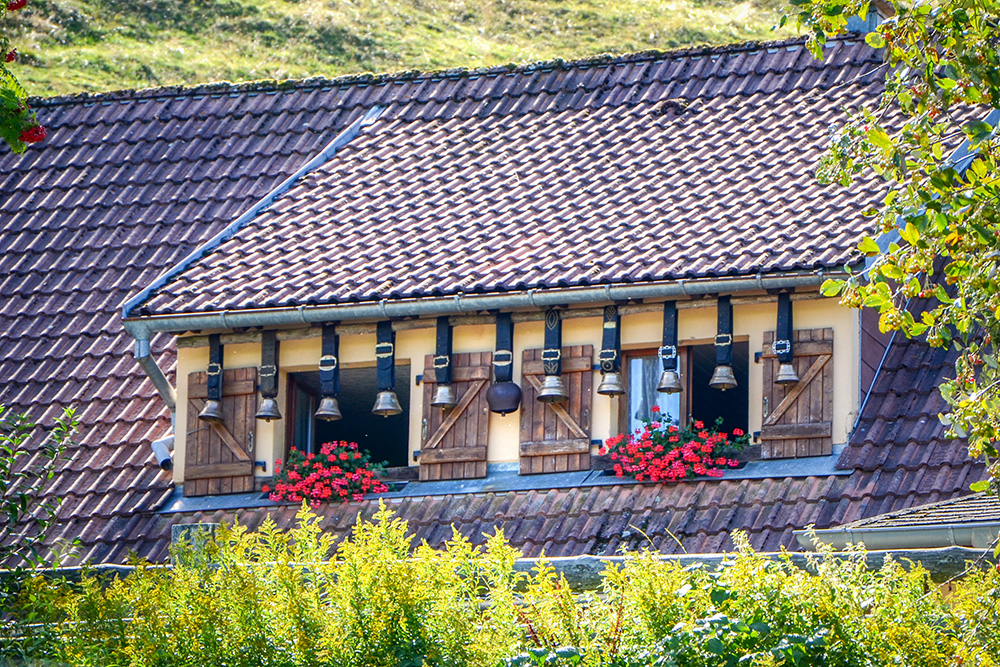
A farm inn in the Doller Valley © French Moments
Here, authenticity isn’t decoration — it’s daily life.
The farmers welcome you into the heart of their working farm, often family-run, and invite you to share their meal.
The menu is simple, generous, and almost always follows the same pattern: a soup or fromage blanc to start, roïgabredeldi served with smoked meat, and finally a fruit tart — most often blueberry, those tiny wild berries that stain the tongue violet.
A word about the roïgabredeldi
From my research, I found that in the old days, in the marcairies of the Munster valley, potatoes were cooked in large pots placed directly in the hot ashes of the fireplace.
When there was a fireplace, the pot was placed on a grill above the embers, which gave it that typical slightly smoky flavour.
Nowadays, potatoes are cooked in a frying pan rather than in the ashes, because over time, pan-frying has become the preferred method - simpler and more practical.
In truth, the farm inn experience goes well beyond what’s on the plate.
It lies in the atmosphere.
In the large communal room with its heavy wooden tables, where you happily sit next to neighbours you’ve never met before.
In the mingled scents of cowshed and kitchen — a fragrance that unsettles you at first, but soon becomes part of the charm.
In the spontaneous conversations, sometimes with the farmer himself, who might tell you about his herd, his work, or yesterday’s weather on the ridge.
In short, stepping into a farm inn means entering a mountain home where you are welcomed not as a customer, but as a guest.
And that makes all the difference.
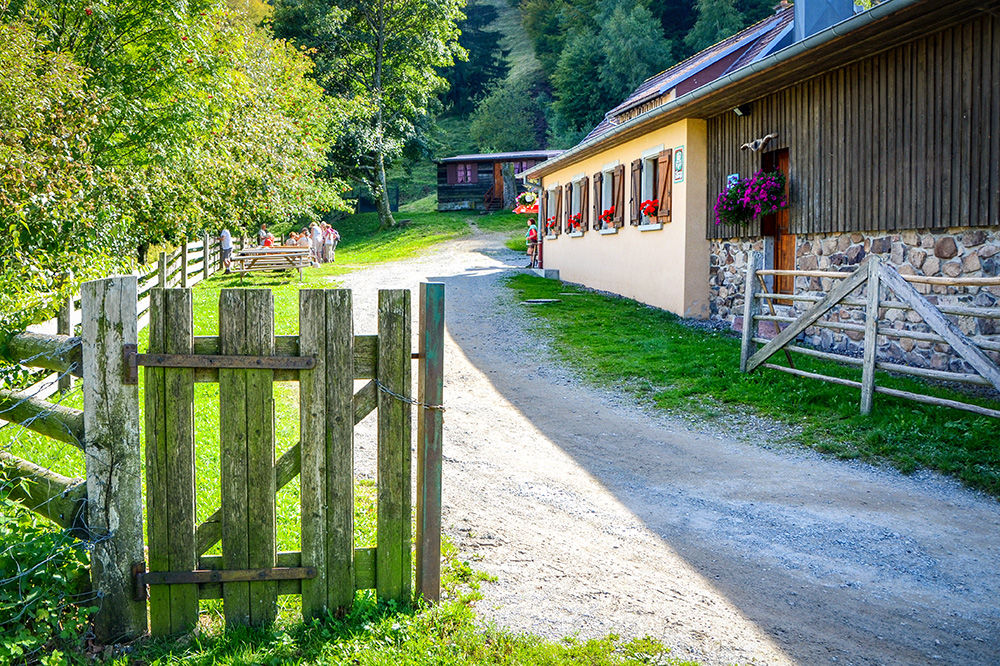
Arriving at a Farm Inn (Doller Valley) © French Moments
The Origins of the Marcaires
To understand today’s farm inns, we have to go back a very long way.
As early as the 9th century, peasants from the Vosges valleys would drive their herds up to the hautes chaumes — those windswept upland meadows.
The idea was simple: free up the hay meadows down in the plain for winter fodder, and make use of the fresh, fragrant grasses up high.
These mountain farmers, known as marcaires (from the Alsatian dialect malker, “the one who milks the cows”), spent the whole summer in small summer farms, the marcairies.
Their daily routine? Milking cows, making butter, and above all producing cheese — the famous Munster (or Géromé on the Lorraine side).
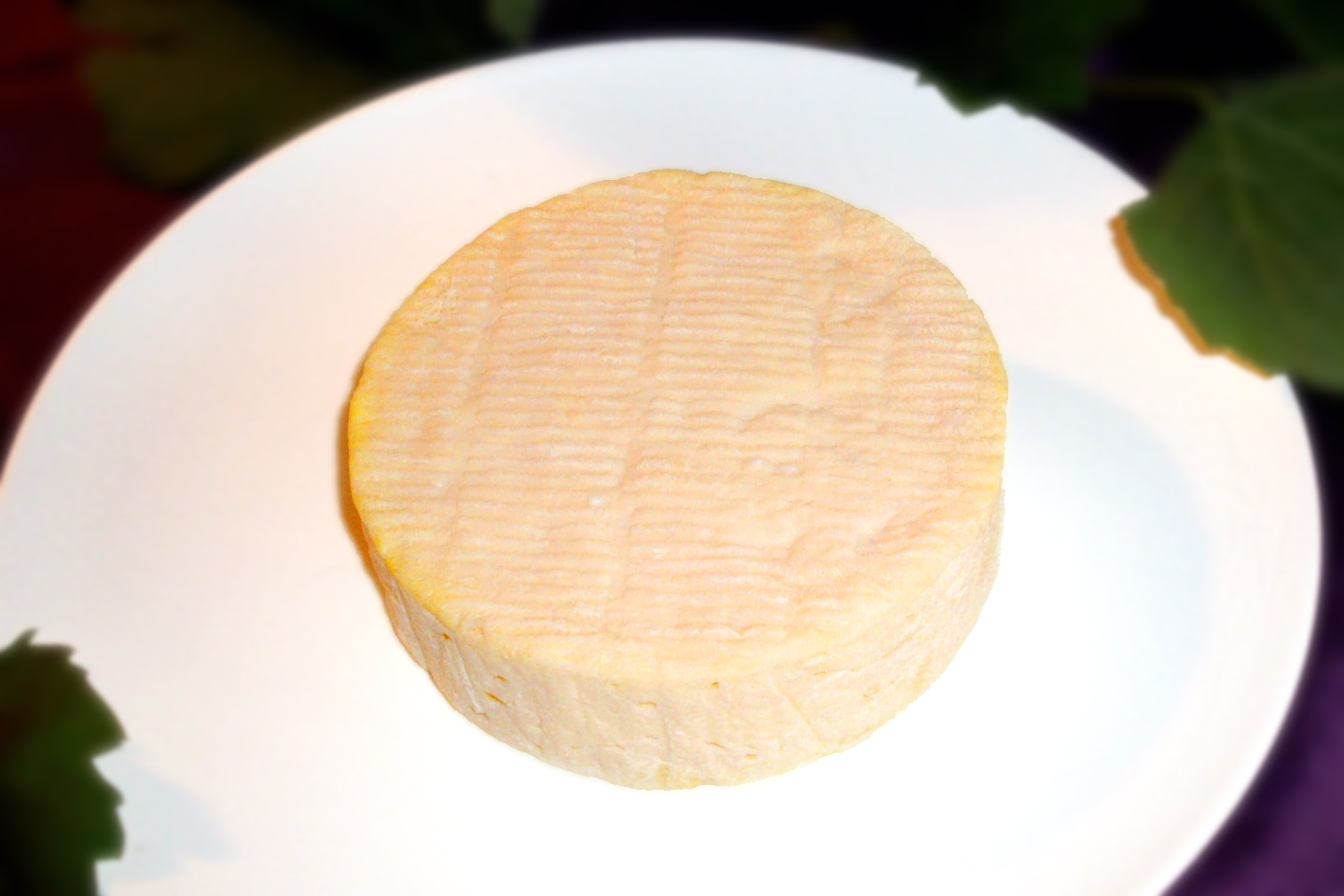
Munster cheese © French Moments
To keep themselves going, they came up with a hearty, sustaining meal: potatoes baked in the ashes, smoked meat, and fresh curd cheese drizzled with kirsch.
This was the marcaire meal, which would become the soul of every farm inn.
From Marcairie to the Vosges Farm Inns
By the 19th century, the marcaires were no longer alone on the chaumes.
The first hikers began to appear: botanists in search of rare plants, curious travellers, then lovers of the great outdoors.
At first, the welcome was rudimentary: a bowl of hot milk, a hunk of cheese, and for the lucky few, a place to sleep above the cowshed.
Then, in 1872, the creation of the Club Vosgien and its marked footpaths made the phenomenon explode.
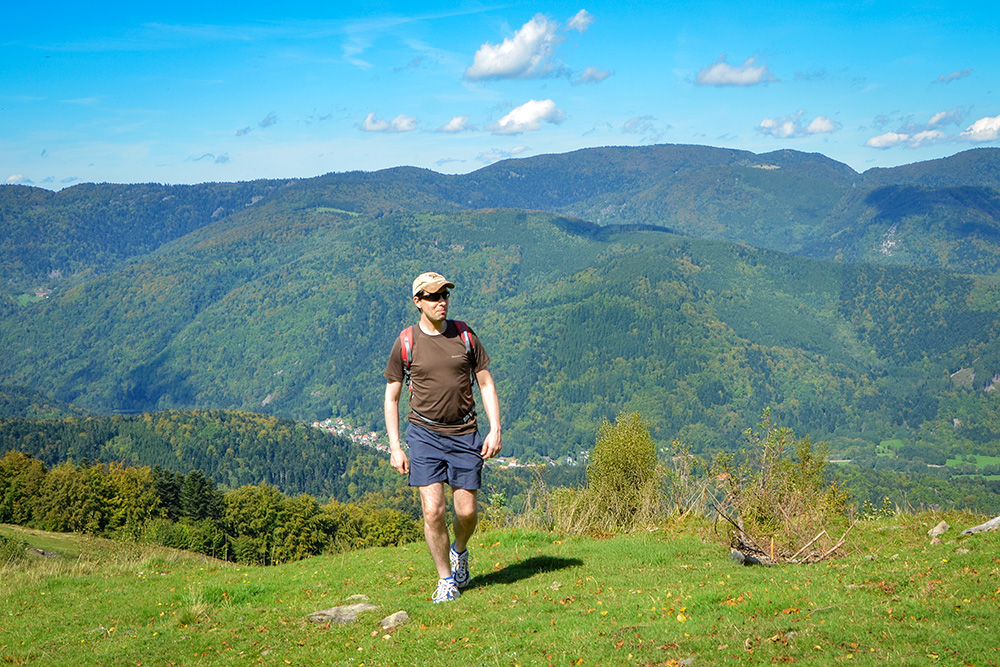
Walking in the Vosges © French Moments
In 1907, a road linked Munster to the Col de la Schlucht, making access easier and bringing in more visitors.
Little by little, the marcairies evolved into the Vosges farm inns, offering a more organised welcome, yet still faithful to their original spirit.
History was not without setbacks: industrialisation, rural exodus, and the wars drastically reduced their numbers.
But after 1945, with the spread of the motorcar and a growing thirst for nature, the farm inns found a new lease of life.
In 1971, an association of the Vosges farm inns was founded, with a clear charter:
at least 70% of the produce must come from the farm itself,
the welcome must remain family-based,
the environment and traditional architecture must be respected.
In practice, it’s hard to follow every rule to the letter.
But the essence lies elsewhere: in keeping alive a way of welcoming guests that is sincere and rooted in farming life.
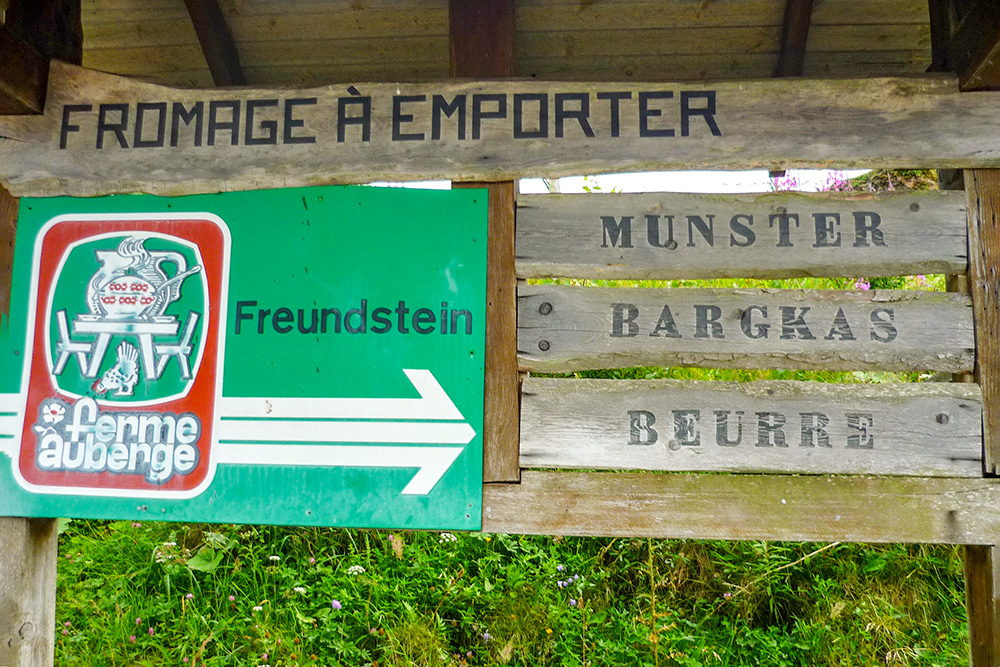
Directions to the Freundstein farm inn © French Moments
The Vosges Farm Inns: A Living, Sensory Experience
You don’t go to a farm inn to “eat well” in the gastronomic sense. You go there to live an experience.
Picture it: after several hours of walking, you push open the door of a large wooden room.
The smell hits you — a heady mix of nearby cowshed and blueberry tart fresh from the oven.
The tables are long, the benches welcoming hikers, families, backpackers and locals side by side.
Conversations spark up, glasses are raised with local wine or a strong eau-de-vie.
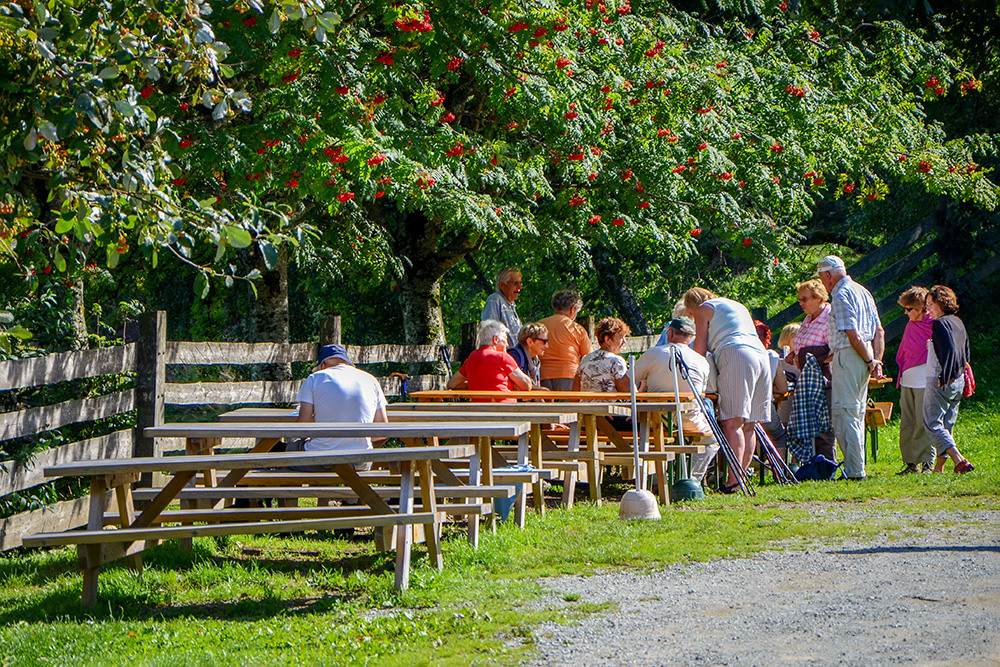
In summer, we prefer to eat outdoors! © French Moments
Then comes the marcaire menu.
No frills: it’s usually a set meal, generous, and served with a smile.
Steaming roïgabredeldi, smothered in cream and served with bacon or smoked pork shoulder.
Fresh curd cheese topped with a splash of kirsch, as refreshing as morning dew.
And finally, the blueberry tart (tarte aux myrtilles), its sweet-sharp tang filling your mouth — and staining your fingers.
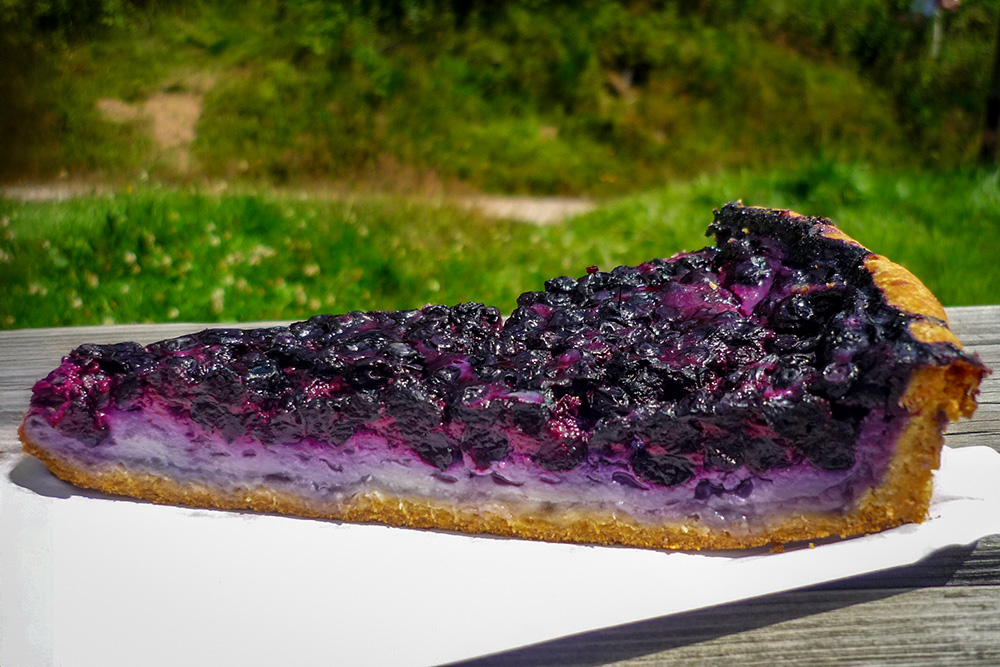
Blueberry Tart - Tarte aux myrtilles © French Moments
At that moment, you realise it’s not just a meal you’re eating, but a piece of the mountain itself.
And afterwards? You gladly lie down in the grass for a digestive nap in the sun, your gaze resting on the ridges and valleys.
A simple happiness, rustic and yet unforgettable.
The Farmer-Innkeepers: Guardians of a Living Mountain
Today, farm inns are far more than simple gourmet stops.
They are run by genuine farmer-innkeepers, heirs to the marcaires.
These men and women carry on a centuries-old tradition while ensuring the survival of their farms.
Their role goes well beyond the plate:
- they maintain the open landscapes of the high pastures, without which the forest would swallow everything;
- they guarantee a human presence in the mountains, essential to the balance of the region;
- they combine pastoral farming, tourism and the local economy in a single gesture;
- and they welcome visitors with a disarming, irresistible simplicity.
In other words, to go to a farm inn is also to support a fragile yet precious mountain agriculture.
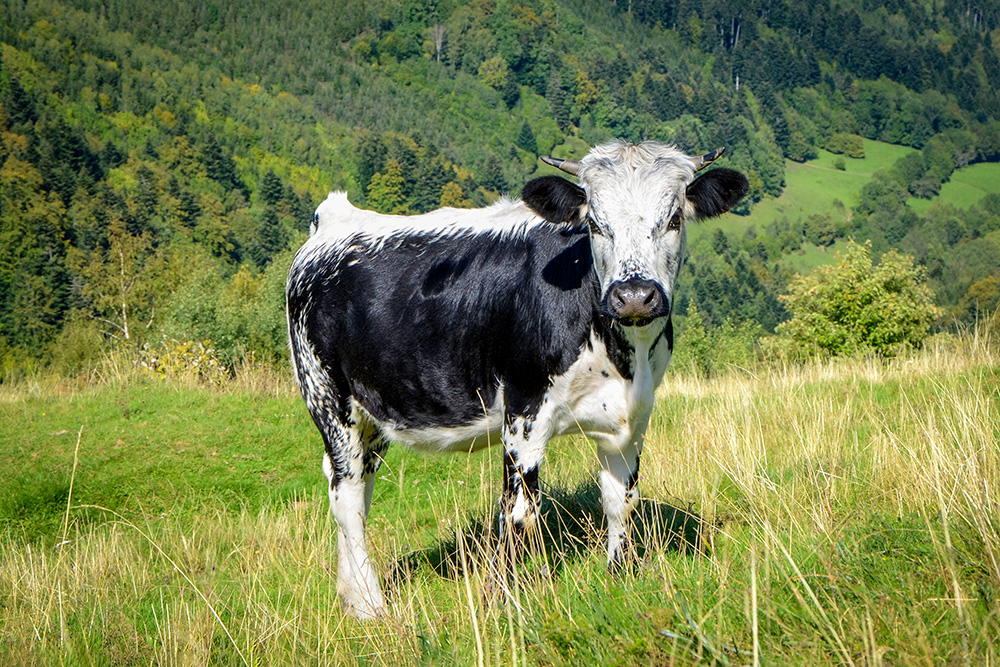
The Vosges cow - la Vosgienne © French Moments
The Vosges Farm Inns: A Unique Cultural Identity
The marcaires are not just farmers: they have entered collective memory.
In popular songs, in village festivals, in stories passed on by the fireside.
They even have a patron saint: Saint Lawrence, celebrated on 10th August, marking the height of the summer season.
Folklore is never far away: the sound of an alphorn echoing across a ridge, mountain festivals (Barikelb) held in front of the farms, traditional costumes — a short work jacket in cotton drill, dark velvet trousers, wooden clogs, and the famous leather cap, the Malkerkappala.
All of this forms part of an imaginary world that is still very much alive, and which visitors often stumble upon with surprise.
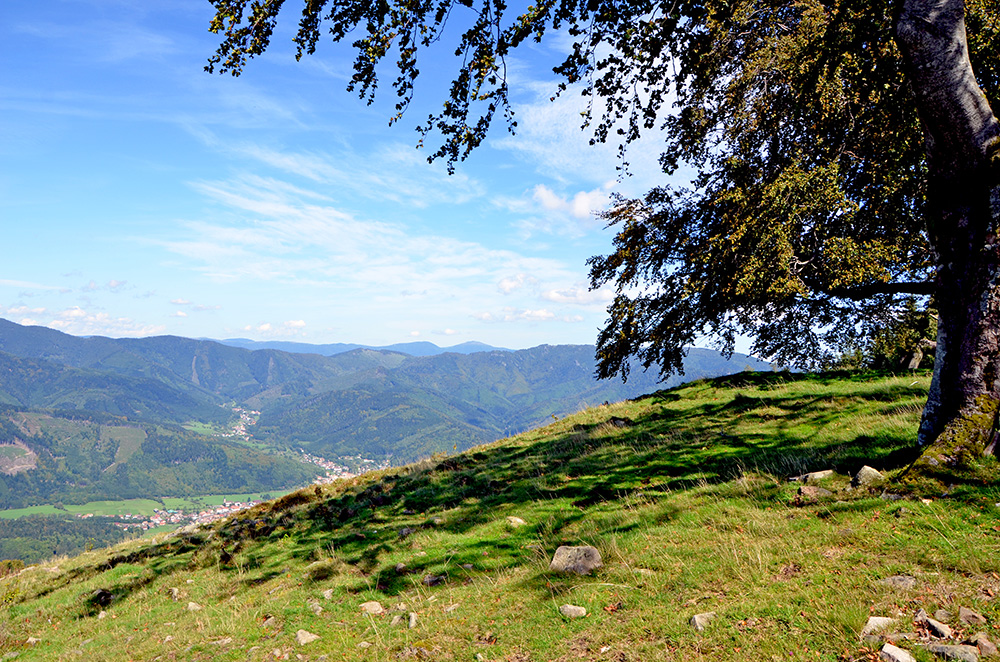
Hautes chaumes in the Vosges mountains © French Moments
Walks and Green Tourism
The Vosges farm inns are not just about a hearty meal.
They are often the starting point — or the destination — of a mountain walk.
The Ballons des Vosges Regional Nature Park has even designed short, easy routes to enjoy before or after a meal.
You walk for an hour, discover a panorama, a natural curiosity, a trace of local history… and then you return, appetite sharpened, ready to savour the farmers’ table.
These walks complete the experience: you don’t just eat, you breathe the mountain and immerse yourself in it.
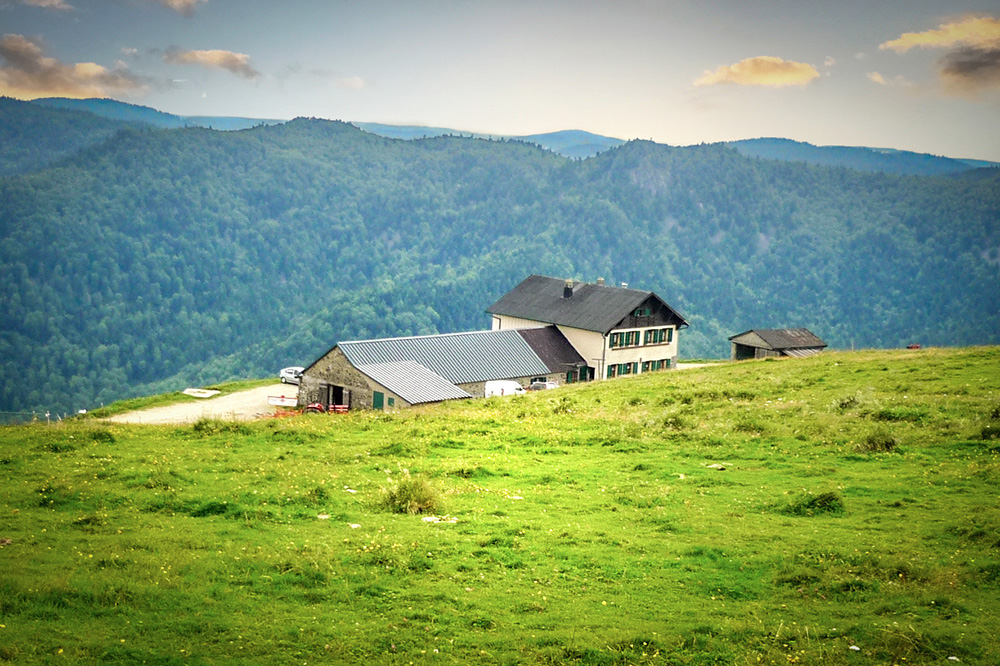
A farm inn in the Vosges near Le Markstein © French Moments
The Vosges Farm Inns: Conclusion
The Vosges farm inns are not just another kind of restaurant.
They are places where history, tradition and conviviality intertwine.
Here, you taste a simple, generous terroir, you meet passionate men and women, and you rediscover the precious bond between the mountains and those who roam them.
For me, every visit to a farm inn is tied to a vivid memory: a meal after a long walk, a blueberry tart that stains your fingers, a digestive nap in the grass facing the ridges (when the weather still holds, at least!).
So many small scenes that remind us happiness can be found in the simplest things.
So, if you ever find yourself in the Vosges, give in to the temptation.
Climb up to the chaumes, push open the door of a farm inn, and accept the invitation.
It’s not just a lunch stop: it’s an experience, a fragment of living mountain you carry away with you.
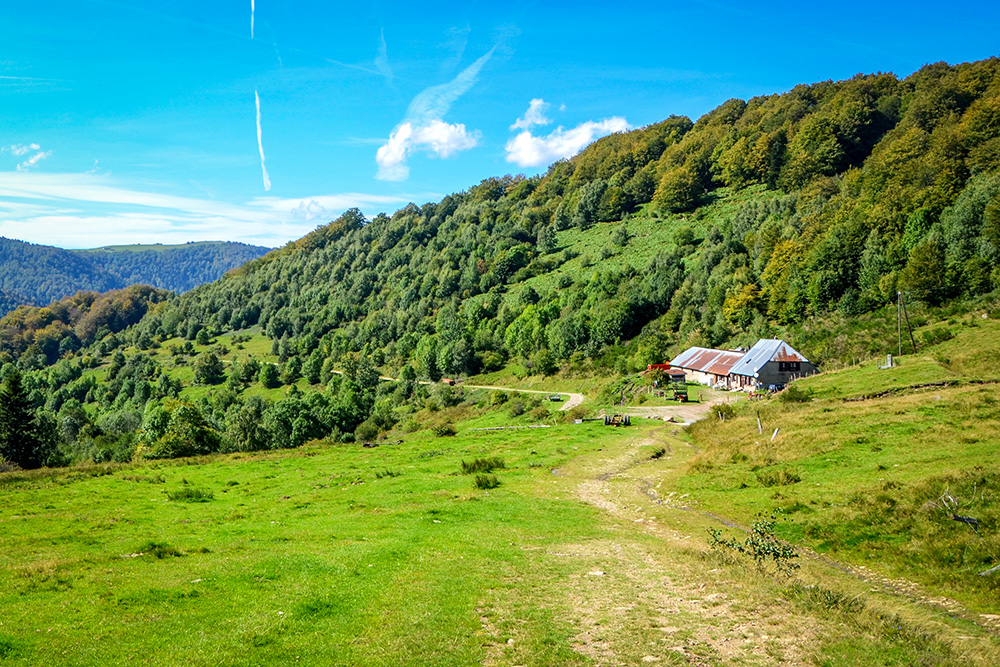
One of the Vosges Farm Inns in the Doller Valley © French Moments
Further Reading
Here are a few useful links if you’d like to know more about the farm inns of the Vosges:
- Farm inns in the Saint-Amarin valley on Hautes-Vosges d’Alsace
- The official website of the Fermes-Auberges in Alsace
- The Vosges Massif on the blog
- Munster: the venerable cheese of the Vosges on the blog
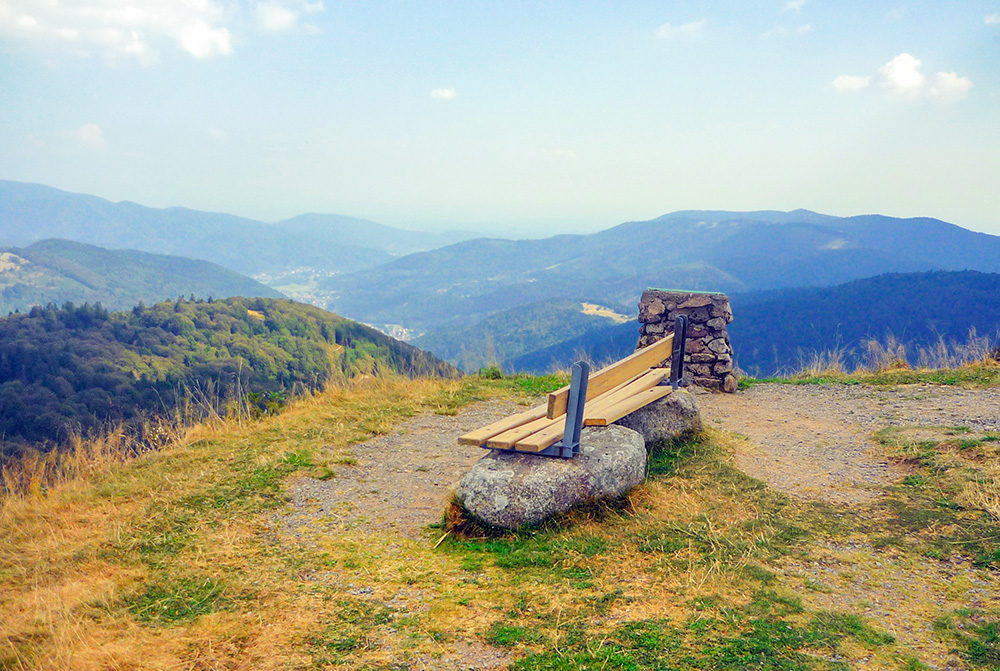
The Ballon d'Alsace (1247 m) © French Moments



